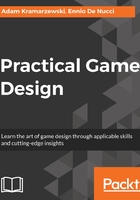
Specialization and T-shaping
More specialized positions only make practical sense in a big team or a large company that can support them. Look carefully at the opportunities available to you as well as your interests. If you have another passion, explore it; there's a high chance it will become useful or inspiring. An interest in creative writing and storytelling can lead towards a career as a narrative designer. An artistic aptitude and interest in 3D modeling and world-building will naturally lead you towards level design.
On the opposite side of heavy-specialization lies T-shaping: broadening your skill set and the spectrum of tasks you can handle. Developing a broad range of skills (even at an entry level) is always a good idea.
Ultimately, your job is not to design the perfect gameplay system and walk away. You are there to help realize the game's potential, turning it into the best possible experience for your players. Sooner or later on a project, you'll find an area outside of your core responsibilities that you'd like to improve, and often it's much faster and easier to just work on it yourself rather than to create a ticket in the system for someone else to eventually (if ever) address. For the record, I am not advising you to be a rogue agent who constantly messes with other people's work and tries to sneak things past the quality assurance team. I am simply asking you to be very proactive and constantly seek opportunities to improve things. The difference between good and great is that extra attention that often wasn't planned for and isn't necessarily part of the original specification. When things are good enough, derailing other team members just for a tiny improvement is not warranted or productive. In these situations, a wide skill set can enable you to turn great into excellent. Just make sure to share the changes you've made with others—leave the surprises for the players, not for your team!
A variety of skills will turn you into a more helpful and independent team member, allow you to communicate more effectively with experts from different fields, and even improve your creativity. One of the most coveted ones is programming. However daunting it sounds, taking even the most basic scripting courses and tutorials will be hugely beneficial. It will improve your understanding of how games work (including the constraints and possibilities at hand) and perhaps even allow you to create or tweak parts of the game without having to rely on programmers. Just make sure they review your work and decide it's up to their standards!
When it comes to tools, word processors, spreadsheets, and presentation software are absolutely essential, but don't forget about the powers of pen and paper! Even the most basic drawing can help clarify your ideas and avoid confusion. On top of that, having a working knowledge of popular game engines such as Unity and Unreal is highly desirable, and both offer easy-to-follow tutorials. Any generalist should also look into learning 2D and 3D art software, audio and video editing suites, as well as looking into the VFX (visual effects) editors built into the aforementioned game engines.
As for personal growth beyond tools and game theory, I suggest self-studying in psychology (especially cognitive science), creative writing, physics, and economics. But remember, you learn most when you're having fun. Focus on something you enjoy or wish you could do. Take things at a manageable pace and stay on the lookout for new tasks and opportunities to jump on. Experiment, stay curious and don't believe everything you see or hear.